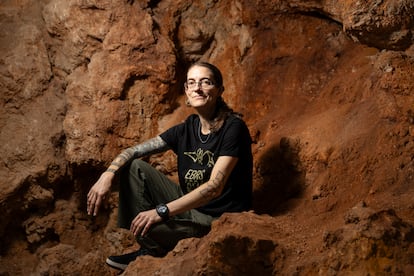Orly Razgour, bat expert: ‘I have never been bitten by a vampire bat, so far’
At an international symposium in Spain, the prestigious biologist warned of a ‘dramatic decline’ in some species, which are affected by climate change


At the bat conference held last week in Tarragona, Spain, it was not easy to catch Orly Razgour. The prestigious biologist and ethologist from the University of Exeter was one of the busiest participants at this massive international meeting that brought together 400 scholars from 45 countries, more than half of them women. At the 16th European Bat Research Symposium (EBRS) — its official name — Razgour was one of the main speakers (she discussed the use of genomics in bat conservation); she also moderated the round tables and tried to follow as much of the torrent of information as possible. So the interview took place during a coffee break, in a space created by placing two chairs in a hallway while other participants rushed past with a faint sound of flapping wings. The 47-year-old researcher, who was born in London but lived in Israel until the age of 18, is a top scientist, but something about her seems to be under the influence of the dark creatures she studies. The tattoos that cover her right arm and part of her left, the black T-shirt with a bat print on it, and a deep, searching gaze help to create an enigmatic, almost Gothic aura about her.
Question. How does one get into working with bats?
Answer. There will be as many answers here at the symposium as there are participants. In my case, it was by chance. I did a research project on them and I found them fascinating. There are objective reasons for you to be interested in them, of course: they play a major ecological role as pollinators, seed spreaders and insect controllers; they can adapt to any place, they respond to challenges. Evaluating what they do in response to the changes that we cause, such as climate change, seeing how they are affected, is fascinating.
Q. Do you have a favorite species among the more than 1,450 that exist?
A. It’s hard to say. Each bat is fascinating in its own way. The grey long-eared bat, Escalera’s bat, Bechstein’s bat... these are the species I deal with the most.
Q. What is the most interesting thing being done these days in the field of bats?
A. At the symposium we heard a lot of interesting things about behavior, the interrelationship between them and between them and us. Phylogenetic studies are very important to understand their evolution. And, of course, diseases and their impact on bats, how they affect them and how they are transmitting agents.

Q. Has the pandemic caused a decline in society’s perception of bats? They were already not seen in a very good light before that.
A. In a sense, yes. But it is the environmental changes that we humans cause that actually create the danger, for us and for the bats.
Q. It has been pointed out that bats bite us quite a bit.
A. I’m surprised to hear you say that, because they live lives very far removed from ours. Basically, because they live at night and they fly. If you catch them, they can bite you, of course, like any other animal. But they don’t have the inclination to do so, they don’t go after us, you can rest assured.
Q. They must bite the people who handle them.
A. Sometimes. You have to take precautions, there are safety protocols. You have to use the right equipment, gloves, know how to hold them.
Q. There’s one living in my house, it flies from one side of the living room to the other.
A. There is no danger, you should take advantage of the opportunity to observe them, they are very interesting animals.
Q. Can they become pets?
A. No wild animal should be.
Q. Have you developed a special appreciation for bats?
A. As with any animal one lives and works with. Again, each researcher will give you a different reason: for many, it’s because of a generic love of nature.
Q. Why do you think bats have traditionally been viewed in such a negative light?
A. As Patti Smith would say, because the night. Because they are the masters of the night and are associated with it; the fear they produce is the fear of the dark. But it has no real basis.
Q. But there are vampires.
A. They’ve got nothing to do with the legends and fantasies. There are only three species of these blood-sucking bats, and only one of them feeds regularly on the blood of mammals, the common vampire bat. It is very rare to find a person who has been bitten by a vampire bat.
Q. Well, my mother was bitten by one when she was a child, in Venezuela. On the lip.
A. Wow [she looks at the interviewer with renewed interest].
Q. Have you dealt with them, with the vampires?
A. Yes, in Costa Rica, I have handled them, but I have never been bitten by one, so far.

Q. What is the conservation status of bats?
A. We are seeing dramatic declines in some populations, which is very bad news. It generally depends on the species. Climate change is affecting them in different ways. There is cause for concern. Some are already extinct, such as the Christmas Island bat (Pipistrellus murrayi) in Australia, which has not been seen since 2009. Another big problem is cats.
Q. Bats don’t seem like they’re easy to catch.
A. There are cats that have become great specialists in hunting them. From the rooftops.
Q. The life of a bat researcher must be adventurous, right?
A. It depends on the species you are studying, whether it is one that lives far away or in caves.
Q. More than half of the participants in the symposium are women.
A. Unfortunately, women continue to have a limited presence in the world of science, especially in senior positions, but in the field of bat studies, efforts have been made to promote them and give them visibility, and the symposium reflects that.
Q. Your name, Orly Razgour, sounds a little Transylvanian if pronounced with a Bela Lugosi accent, to be honest.
A. It’s true that it’s unusual. My Polish grandfather, who was an artist, invented the surname. It’s unique in the world, only my family has it.
Sign up for our weekly newsletter to get more English-language news coverage from EL PAÍS USA Edition
Tu suscripción se está usando en otro dispositivo
¿Quieres añadir otro usuario a tu suscripción?
Si continúas leyendo en este dispositivo, no se podrá leer en el otro.
FlechaTu suscripción se está usando en otro dispositivo y solo puedes acceder a EL PAÍS desde un dispositivo a la vez.
Si quieres compartir tu cuenta, cambia tu suscripción a la modalidad Premium, así podrás añadir otro usuario. Cada uno accederá con su propia cuenta de email, lo que os permitirá personalizar vuestra experiencia en EL PAÍS.
¿Tienes una suscripción de empresa? Accede aquí para contratar más cuentas.
En el caso de no saber quién está usando tu cuenta, te recomendamos cambiar tu contraseña aquí.
Si decides continuar compartiendo tu cuenta, este mensaje se mostrará en tu dispositivo y en el de la otra persona que está usando tu cuenta de forma indefinida, afectando a tu experiencia de lectura. Puedes consultar aquí los términos y condiciones de la suscripción digital.








































